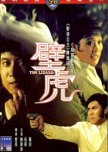
Back to The Lizard. Yueh Hua played the titular role AKA Cheng Long/Brother Dumb. Cheng Long was a stuttering and bumbling police officer by day and a skilled martial artist and jewel thief who robbed wealthy foreigners by night always leaving behind a lizard calling card. Connie's Xiao Ju was close friends with the bumbler and an admirer of the masked hero. Lo Lieh played the corrupt Chief Chen who used his position to fleece the locals at his rigged casino and make connections with the wealthy foreigners. The Lizard runs afoul of Chen and the game is on, with the odds against the Robin Hood of the people.
A few years prior, Connie might well have played the Lizard, but Hong Kong martial arts movies were headed in a decidedly more machismo and bloodier direction by 1972, mostly leaving behind the glorious heroines of the 1960's. Connie, Josephine Siao and Cheng Pei Pei could probably have compared notes. Yueh Hua wasn't as stone-faced as he appeared in many of his martial arts roles, but still wasn't particularly convincing as the burglar who could climb walls like a lizard. Jewel thieves, historically, are played by charismatic actors, something Yueh was missing. Lo Lieh who had often portrayed good guys before Lizard was to play one of his early villain roles, something he would be typecast as for much of the rest of his career. Dapper and sinister in his white suit, maybe he and Yueh should have swapped roles, he would have made for an entertaining jewel thief. Chen's army of casino thugs boasted many familiar stunt men who were fun to pick out, including Yuen Woo Ping.
Yuen Woo Ping was the martial arts director along with Yuen Cheung Yan. Woo Ping would go on to work as a director, action director, and/or martial arts director for movies far more famous than this one, i.e., Crouching Tiger, Hidden Dragon and Kung Fu Hustle. The action scenes for the most part were well choreographed, especially for actors with limited martial arts abilities. The stunt men worked overtime flying high and falling hard to sell the action. The sets were opulent, showing off the wealth of the corrupt officials and foreign occupants. But fear not, there were still tear away sets for the characters who would rather crash through a door than open it and windows that gave way when the bodies started flying.
The movie tried to sell comedy along with the action, missing more than they hit. They needed organic comedy rather than Lydia Shum crossing her eyes in several scenes for laughs. Not only was there comedy but there was also pathos as a couple of loveable supporting characters did not live to see the closing credits. Fair warning, there was gratuitous nudity in the opening scene, a sex scene that seemed to go on forever featuring an overly made-up blonde woman.
I suppose I wrote more about the cast and crew than the story because the film should have been better and more exciting. The Lizard could have been a stylish and taut thriller if so many opportunities hadn't been missed. Too often, the momentum stalled and the story lumbered along. Connie may not have been the most skilled fighter, but she added enthusiasm to every scene she was in which were far too few. The Lizard wasn't a bad 1972 kung fu movie, and certainly was one of the most beautiful SB films in terms of aesthetics, somehow, I just didn't find it enthralling even though I desperately wanted to. Having said that, for old kung fu movie enthusiasts, I could easily recommend giving this one a try, especially if for some of us, it's the only chance to watch The Movie Fan Princess (1966) in action.
7/19/23
Was this review helpful to you?
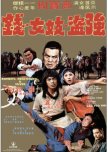
This review may contain spoilers
"From now on you live by violence"
Bandits, Prostitutes, and Silver was a dark kung fu film from Taiwan. No secret lists, no secret books, no Ming rebels, only bandits, prostitutes, and silver, just like the title reads. You could throw in death and dismemberment as well to be more accurate.Shang Li is a carriage driver who is trying to earn enough money to buy freedom for Xiao Chui, the prostitute he has fallen in love with. Earning money the honest way is going to take at least nine more years and there are other interested buyers. He agrees to help the Sparrow, a notorious thief, steal a chest full of silver being transported by another carriage. When Sparrow tells him they have to kill the driver and the official inside, Shang Li balks, refusing to murder innocent people. He and Sparrow end up fighting with Sparrow being killed with his own daggers. The road to Xiao Chui is not easy though because The Red Scar Gang boasting Angela Mao and Phillip Ko Fei are hiding in the bushes waiting to ambush the silver. They are working with Wang Hsieh's Wu and Big Bad Lo Lieh as the corrupt official Pao. When these bad guys start turning on each other the fighting gets interesting. Shang Li tragically learns that crime doesn't pay, nor does it lead to true love.
The fight choreography was above average for the time. Don Wong moved pretty well and the stunt men made sure there were bodies flying everywhere. Wire-fu and reverse photography were used sparingly. The body count was high though the blood was kept to a minimum. There were goofy weapons as these films often have. Angela's character had spinning saw blades on her shoes. Lo Lieh used chains with cuffs on them that could decapitate a person. Wen Chiang Long's Sparrow shot darts out of his wrist bands. Phillip Ko didn't need weapons, he always made a kung fu battle fun even when he was being beaten. Wang Hsieh usually relied on gimmicky weapons or skills, this time he only had stress balls to futilely throw in battle. The charismatic villains improved the quality of the fights and movie greatly. For around the last 40 minutes of the film, the fighting began in earnest as baddie after baddie betrayed each other leading to death. Is there no honor among thieves?
Kao Pao Shu, a rare female director and writer for this genre worked with prolific writer Ni Kuang on the script, giving Bandits, Prostitutes, and Silver more character depth than these films usually have. In many ways this was a morality tale. Shang Li started out as a good guy, although looking for true love in a brothel might not have been the wisest course of action. When desperation drove him to crime, Sparrow was right, "From now on you live by violence." It didn't matter that he tried to minimize the theft and murders, Karma was not going to allow him the desires of his heart, only pain and death awaited him for his transgression. This kung fu film didn't back down from the tragic trajectory it set for the characters as each one paid for their betrayals with retribution coming as quickly as silver coins can fall out of a pocket. As always, I rate these old niche films on a curve, and like most old Taiwanese kung fu films, only fans of the genre may appreciate it.
7/17/23
Was this review helpful to you?
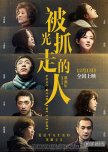
This review may contain spoilers
What's love got to do with it?
Gone with the Light was a thoughtful meditation on what romantic love is and the extent to which we need it in our lives. What happens when an inexplicable beam of light judges your relationship and love as inadequate? Do you examine yourself and your life? Or do you make excuses and justifications? Do you accept that you must live without love?One spring morning a beam of light causes a fraction of the people from the planet to disappear. The story focuses on three people left behind, Wu Wen Xue, a teacher who has been married for nearly 20 years; Lin Nan, an officer worker in the process of divorcing her philandering husband; and Kuai Zi, a small-time hoodlum who says he doesn't believe in love but is desperately searching for his partner in crime. Though not connected their paths do inadvertently cross at times.
"It's only us who can define our love." Wu is the emotional heart of the film as he wrestles with his stale marriage and the discrimination he faces at work for being morally suspicious as one left behind. Wu becomes desperate to prove he and his wife love each other even sinking to buying photoshopped pictures and a fake train ticket showing she was out of town during the beam which explains why they weren't taken together. Initially, he tries to save face during an increasingly unstable social order but soon he is forced to confront the reality that his marriage wasn't working and was built on convenient lies, both his and hers. Huang Bo gave a lovely nuanced performance that strengthened the emotional depth of the film.
"You take in my trash and treat it as treasure." Li Nan is confronted by her husband's mistress when he disappears. The two women begin their odyssey of discovering who he truly loved and disappeared with. Along the way they discover more about themselves and their feelings for the man they shared. They also uncovered parts of his life hitherto unknown, finding neither had truly understood him.
"We're all the same. We don't have love." Kaui Zi was the least developed character, someone who eschewed loved but whose desperation in finding his partner hinted more than a little at a same sex love, at least on his part. Through him we see another man who killed his wife for putting green onions in his stir-fry, an obvious demonstration that she hadn't loved him which is why they didn't disappear.
"It's already proved there's no love." A young woman whose parents refused to let her marry the guy she was in love with watched them disappear during a heated argument. The father had numerous mistresses and the mother was an inveterate gambler and neither ever showed any love toward the other. What is true love?
The light beam was never explained, which is okay, because the story was about the human response not the initial supernatural action. As one character stated, "Love is sci-fi enough." No one truly knew why the people disappeared or if it was even a good thing, but the ones left behind felt envious and ashamed, often sinking into despair. Even when the government eventually refuted the true love entanglement cause, people still felt as if their relationships and their lives had been judged as loveless. Many of the people taken were in affairs or unhealthy relationships, yet people always want what they don't have. For the people who took advantage of the gift of being rejected it gave them the chance to evaluate themselves and their relationships.
Love can be exciting, messy, complicated, pedestrian, and gently satisfying. Other times it is elusive as smoke. People find and cultivate what gives them meaning. The light beam caused those who were left behind to examine what it is they wanted, what might be missing from their relationships, and what responsibility they owned in that. Gone With the Light was a quiet reflection on love and relationships anchored by strong performances. My favorite scene was the last one. It is often during the routine and mundane where we find love, comfort, and even forgiveness. What is true love? Something you have to define for yourself. This film will not be for everyone, but if this is your type of film, you might find a hidden gem.
"The light won't give us an answer. It's a test, a projection of oneself to let us truly face ourselves and then move on in our lives."
7/14/23
Was this review helpful to you?

This review may contain spoilers
Always check the weather report before an assassination
When you put the word "legendary" in your title, there is a lot to live up to. Legendary? This film won't even be memorable. Jacky Wu starred in and directed Legendary Assassin and managed to tick off the boxes for a triad martial arts movie without adding anything new or interesting to the genre. While that could be excused if the fights were…wait for it…legendary, sadly they weren't. Most of the fights were average or below average at best.Bo (Wu) takes a ferry to an island where he assassinates a drug lord and decapitates him. A possible typhoon strands him on the island and he has to lay low. If only there were news programs that had weathermen who could forecast such events. Bo's not worried, especially after he has a meet cute with the local policewoman, Hiu Wor (Celina Jade in her first movie role and it showed), and later saves her when Ken Lo and his two thieving buddies resist arrest. Ronald Cheng briefly offers some comic relief as Uncle G, the noodle shop owner. Bo goes to the police station with Hiu Wor to make a statement and enjoys a meal and camaraderie with the local force, with the exception of Tarzan-Sammy Leung-who hugely overacts. Bo and Hiu Wor have a little kung fu flirting before she's called to work. Meanwhile, Lam Suet and a bunch of baddies who landed the last boat on the island are searching for their boss' head and the person who took it. The movie follows a predictable path from there with Bo eventually having to fight 100 men to save Hiu Wor.
The problem I had with the film was that the writing, characters and acting were so bland that I didn't care about any of the characters. What should have been a tension filled and claustrophobic cat and mouse chase with the bad guys searching for the assassin was anything but. Even when the baddies crashed the police station demanding their boss' body, the fights and acting were so bad that the characters' dilemma failed to concern me. If they didn't care enough to even attempt first aid on an injured officer, why should I care?
By 2008 there were numerous martial arts movies using creative and exciting fight choreography. By reputation, Wu was an accomplished martial artist, but even the most skilled fighter still needs exhilarating choreography to keep up with the genre. Bo went up against 100 men but Wu used the same kick on at least 50 of them with the action either too slow, too sped up, or shot too close. The only fight that was entertaining was early on in the movie at the noodle shop. By the time the dead drug lord's wife started swinging a sword around near the end of the movie my eyes had nearly rolled back in their sockets at the cringe worthy acting and action.
I rate 1970's cheap martial arts movies on a curve, but even though this film was made during the time of the Nokia brick it gets no such consideration from me. I don't mind a by the numbers story if the fights are spectacular, but Legendary Assassin failed to deliver in that department, leaving this viewer with a pile of uninspired characters, uninspired acting, and uninspired fights. I found this movie to be legendarily mediocre at best.
7/14/23
Was this review helpful to you?
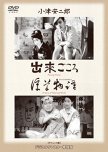
This review may contain spoilers
"Everyone yearns for love"
Before Director Ozu focused on upper-middle class families and father-daughter relationships, he evaluated the working class in this film. In Passing Fancy, the focal relationship was between a flawed father and son who could wind each other up but could also show incredible affection for each other.Kihachi is a widowed father who works in a brewery with his younger buddy, Jiro. After attending a book reading with a shamisen accompanying (Naniwabushi), the two men stumble across a young woman with no family and no job. Jiro votes to leave her behind, but Kihachi asks the local café owner, Otome, to take her in. Kihachi becomes quickly smitten with Harue, however, she sees him only as a kindly uncle. Jiro tends to be a jerk when he's around her and begins to avoid the café. Tomio doesn't approve of his dad's attention for Harue either. When Tomio is taunted about his dad's illiteracy and penchant for drinking after work, Kihachi tosses him 50 sen and tells him to buy whatever he wants, hoping the boy can feel rich for a day. Tomio uses the money to buy sweets and fruit and becomes deathly ill. In order to pay the doctor bill Jiro asks the local barber for a loan. To pay back such a large sum the young man plans to go to Hokkaido where laborers are being hired. He and Harue confess their feelings for each other and say their good-byes. When Kihachi discovers his plan he knocks Jiro out, leaves Tomio in his neighbors' care and heads to the boat. Kihachi must decide whether his pride or his love for his son will win out.
The story was sparse, but feelings ran deep. Kihachi realized his shortcomings as a father but desperately loved his son. Even though Tomio was at times embarrassed by his dad, he was devoted to him. Although Kihachi was infatuated with Harue he was willing to play matchmaker for her and Jiro. Jiro loved Harue, but cared for his friend and for most of the film stayed away from the young woman out of respect for Kihachi. Harue felt indebted to Kihachi but loved Jiro. Otome might have had feelings for Kihachi, but even though they were about the same age, typically, he only had eyes for someone half his age. At times the relationships felt more like a love circle or a spirograph than any other geometrical description. In later Ozu films, the nuclear family was the beginning and end of problems and problem solving, but in this film, the family is a made family. The friends and neighbors genuinely believed it was their responsibility to help each other. Rather than a nuclear family, the community was the emotional core of Passing Fancy. That's not to say there wasn't humor, it ran the gamut from an antic about a wallet at the reading, to Tomio waking his father and Jiro with a thick stick and Tomio striking childish movie poses. But even when the story turned slightly darker with Tomio berating his father and being cuffed on the head, the emotional catharsis that followed granted father and son exactly what they needed.
Before his rigid shots and perfectly formed compositions, Ozu used a more fluid style. Though he utilized lower camera angles, the characters were shown more full body than the later static shoulders and above style. The rooms were messier and more lived in. Sakamoto Takeshi (Kihachi) and Tomio Aoki (Tomio) would work together the next year on Ozu's Floating Weeds. As he did in Weeds, Sakamoto constantly wiped himself off and often sat his handkerchief on his head. Both he and Tomio scratched in most scenes, much in the way men do when women aren't present. Unlike the impeccably dressed characters of his later films, these men wore scruffier clothes and Tomio was usually dirty. Fathers in his later films were more respectable, giving more forethought to their actions. Kihachi had never seen a reason to try and save money until Tomio fell deathly ill and did little planning. Poor Tomio, children in old Japanese and Chinese films often ended up at death's door over a piece of cake or sweets of some sort.
Neither father nor son were perfect which is what made this film so enjoyable. They fought, they made up, they dealt with crises, and found a way back to each other. Neighbors took care of one another and love found a way. Passing Fancy may have been short on story but was no passing flame, it had great heart and staying power.
7/12/23
Was this review helpful to you?
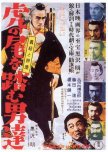
This review may contain spoilers
"The road ahead is more important"
Kurosawa filmed The Men Who Tread on the Tiger's Tail in 1945 but due to Japanese and American censors the film wasn't released until 1952. Based on a Kabuki play which was based on a Noh play which was based on a famous legendary event in 1185, the film retained the look and feel of a play. The event involved a famous samurai and his six loyal retainers attempting to seek refuge far away from his murderously paranoid brother.The story retells the tale of Yoshitsune who helped his brother defeat his enemies and become Shogun. Despite all his help, Yoritomo, like any loving brother would, decided Yoshitsune was a threat and ordered his "capture". Yoshitsune escapes with six loyal retainers, including the fierce monk samurai Benkei. As they travel through the woods dressed as monks, the audience is treated to a chatty, unhinged porter who informs them that the check point guards are looking for samurai disguised as monks. Some unlucky monks were cut down recently at the checkpoint---so much for capture being the goal. Yoshitsune disguises himself as a porter, but having never carried his own equipment, is shaky with handling the load. When they arrive at the barrier, Benkei works for their release by appealing to the magistrate, Togashi. Eventually, after several close calls, Togashi allows them to pass. As long as you don't read the next chapter in history, it's a happy ending!
One of the reasons that the Japanese failed to list Kurosawa's film officially, which caused the occupying forces to ban it, was that certain censors felt like Kurosawa had treated the revered samurai too lightheartedly, especially with the addition of the comical porter. The porter who mugged for the camera when he wasn't bouncing around was annoying. He was a prescient combination of the jester in Ran and Mifune Toshiro's deranged samurai in Seven Samurai/Rashomon. Whether he was comic relief or an avatar for the audience, I could have used less of him onscreen.
The main character in this film was not Yoshitsune, but rather Benkei, at least when the porter wasn't laughing maniacally and stealing focus. The monk did most of the planning and when confronted with the opposing forces at the border pleaded their case to Togashi. This included a 3 ½-minute reading of a Buddhist "proclamation" which felt twice that long. When Togashi sent the "monks" food and drink afterwards as an apology, there was an 8-minute drinking, dancing, singing segment. There were several singing segments, the film was much like a musical play.
Aside from Benkei, Togashi was the other compelling character. The way he was played it appeared he knew the monks were Yoshitsune and his men and purposefully let them go much to the consternation of his underling. When he sent the drinks, which Benkei took very seriously and ceremoniously, it caused me to wonder if Togashi would have to forfeit his life when it was discovered Yoshitsune had eluded him and Benkei was aware of that sacrifice as well.
As I mentioned, the film felt theatrical and simple. Maybe Kurosawa was filming on a wartime budget which might have accounted for the short running time. There were very few settings, only indoor sets with painted backdrops and fake trees. With the exception of opening fog, his signature wind was missing. Unlike Kurosawa's wider shots from later films with action going on in three layers, most shots were narrowly focused in small frames. This film felt lacking in energy and urgency, especially for men on the run with the enemy lurking about. Instead of his fluid shots with action carrying the story forward, even if it was just the weather giving movement, much of this film showed men squatting or manspreading or simply standing around. For a Kurosawa film it felt strangely static.
As a brief lesson in Japanese history, it was interesting to learn a little bit about this famous samurai. What came after this story was even more fascinating to me. A few years later, to give his lord time to commit seppuku when they were betrayed and surrounded, Benkei guarded the way in, taking so many arrows he died standing up. Such was the nature of his reputation that the opposing side waited before checking to see if he was alive. While most foreign audiences wouldn't have known this story didn't ultimately have a happy ending, reading more about it did give what appeared on stage more depth to me.
I found the porter grating instead of humorous, although in the end he did show his loyalty and use. Benkei proved to be fast on his feet when it came to crossing words with the enemy. And the enemy turned out to understand that murdering one's own brother might not be the best way to instill trust in people. The Men Who Tread on the Tiger's Tail was fairly entertaining and a nostalgic look back at Kurosawa's fourth film. How well you enjoy it may depend on how well you enjoy the porter's antics and dialogue interspersed with song.
7/10/23
Was this review helpful to you?
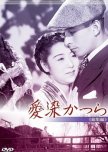
This review may contain spoilers
Use your words!
Aizen Katsura AKA The Tree of Love was a melodramatic love story with a plentitude of nice people who excelled at communication except for the two people who mattered most. But how else to keep two pleasant people apart except with timeworn misunderstandings and lack of communication? Katsue and Kozo would test the Tree of Love's blessing and patience to find out if it was strong enough to grant them everlasting happiness.Gentle Katsue earns a living as a nurse supporting her daughter as well as her older sister. The problem being, that nurses have to live in the dormitory and are expected to be virgins---no married women! When Katsue is caught in the park with her daughter a fellow nurse convenes a late-night accusation party. After Katsue explains she's been a widow since she was eight months pregnant and had been forced to marry at eighteen, her fellow nurses declared solidarity with her. The hospital owner's son returns after his medical training and promptly falls for Katsue when she sings at his party. They begin seeing each other and Kozo makes what amounts to his declaration at the Tree of Love. His father has arranged a marriage with Michiko, an American educated young woman, whose father is also a doctor, a plan Kozo rejects. When he decides to travel to Kyoto so that he and Katsue can be together she agrees. Unfortunately, her daughter falls ill and she doesn't make the train. Kozo assumes the worst, that she's dumped him and doesn't contact her again. From there it's a series of more misunderstandings and near misses.
The romance in Tree of Love was pretty thin even though it was a popular movie in its time. As many films from this period did, it highlighted the plight of single women and single mothers. Few jobs were available to women, much less married women. Aside from having to work to survive, as a young widow, Katsue wasn't going to be most parents' first or tenth choice for a child's spouse. One of my favorite aspects of this story was the generous support of Katsue's fellow nurses. Not a jealous, spiteful woman in the lot. From beginning to end, they had her back which I found delightful as positive women's friendships tend to be scarce. Even Michiko, the possible fiancée, was understanding and kind, looking out for Kozo's best interests even if she didn't end up as his wife.
Tanaka Kinuyo was lovely as the gentle Katsue believably portraying a nurse and caring mother, a genuinely likeable heroine. Uehara Ken had little to do but sit around looking dashing, which he did well and Kozo was never cruel to Katsue even with the misunderstandings. Though it was billed as a melodrama, with people this beautiful and amiable, supported by Katsue's cheerleading squad of friends, this sweet couple didn't need a Tree of Love, more like a Tree of How to Use Your Words. If you enjoy older movies, Aizen Katsura is not a bad way to spend 90 minutes.
7/4/23
Was this review helpful to you?

This review may contain spoilers
"Some swords are useless no matter how you polish them"
Sword for Hire AKA Vagabonds in a Country at War told the tale of three samurai who survived the destruction of their castle and where they ended up afterwards. Two intersecting love triangles formed with one man at the point complicated matters between the former allies. It is important to note that the surviving print is missing 30 minutes, so while you may see running times of 2 hours 15 minutes listed, at present, the film is only 1 hour and 45 minutes long. It is also badly faded and degraded making some scenes difficult to see.Mifune Toshiro as Hakate, Mikuni Rentaro as Jurota/Jurata, and Ichikawa Danshiro III as Yaheiji are facing imminent death when opposing forces are set to overrun their castle. Jurota abandons the fight taking Hakate's love, Kano, with him as cover. Hakate escapes during the fighting even though he is badly wounded. Yaheiji is captured but is able to overpower his captor and also escapes. Jurota joins another army hoping to make a name for himself. Hakate is rescued by the female bandit Oryo and nursed back to health. Yaheiji becomes the leader of another band of bandits. Hakate once more is on the run when it looks like he killed Oryo's father. He joins a competing army to Jurota's. Put that all in a blender and the characters start mixing, and falling in love, and just missing each other or running into one another. It becomes a complicated mess of human emotions.
Sword for Hire was entertaining but came across as a low budget samurai movie. The sets made the scale of the film quite small. Kurosawa Akira was credited as one of the writers, but there seems to be some debate as to how much he contributed.
Of all the characters, I was at first intrigued by Shirley Yamaguchi's Oryo. She was fierce and flamboyant but quickly devolved into the stereotypical obsessive and hysterical female character from this time period. Asaji Shinobu's Kano was the typical cardboard female character who could have been played by anyone. I enjoyed seeing Shimura Takashi as an inn/restaurant owner who gave completely ignored advice and snippets of wisdom to Jurota. When you could make him out through the foggy weather and foggy film, Mifune Toshiro looked sublime. Ichikawa made for a rough and tumble "rock" with a heart of gold. Mikuni was relegated to the braggart and self-serving character of Jurota, the "useless sword" Shimura's character spoke of.
I'm not sure where the missing minutes were from as there was a proper beginning, middle, and ending to the film. The story didn't feel strong enough to add 30 more minutes of flabby middle to it, or perhaps it would have enthralled me. Maybe the added scenes would have filled out the love triangles/pentagram/hexagram (these rotating couples are beyond my geometric skills) that ultimately seemed pointless in this version as the women only had eyes for Hakate. There wasn't enough fighting for a good civil war film or enough loving for a romance which left this Sword for Hire without a buyer.
7/3/23
Was this review helpful to you?
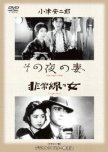
This review may contain spoilers
How far will a father go to save his child?
That Night's Wife was an early Ozu crime film that still managed to focus on a family as many of his later films would. The three main characters all found themselves facing moral dilemmas and acting out of character, at least briefly, all for the sake of sick child.Shuji is a father driven to desperation one night because his child is dangerously sick and he needs money for her treatment. He robs an office and is at once chased by the police. Thinking he has found safety in a taxi, unbeknownst to Shuji, it turns out the driver is an undercover police officer named Detective Kagawa. Once home, Shuji explains what he's done to his wife, Mayumi, who is not pleased. Kagawa comes knocking at the door, not taking no for an answer. Shuji helplessly hides behind a curtain, as Kagawa begins to search the small apartment. Mayumi pulls the gun used in the robbery on Kagawa and tells him that no one is going anywhere until her daughter is better. During an uncomfortable night, the detective sees their poverty and utter devotion to their daughter. The next morning, the doctor arrives and declares little Michiko on the mend. Kagawa feigns sleep and Shuji seems to be making an escape, but when Kagawa opens the door, the sober headed father has returned. Shuji wants to serve his time as he should so that he can be a father his daughter would be proud of.
Ozu wasn't afraid to be critical of the societal structure that left many without and parents faced with dire decisions to safeguard their children. As other authors would ask, should a person go to jail for stealing bread to feed his child? What lengths would a person go to, to save his child when society deemed her unworthy of saving? Shuji, the devoted, loving father, acted out of character by robbing people at gun point. Mayumi, the traditional, gentle wife, acted out of character by pulling a gun and basically holding Kagawa hostage. Kagawa, the hard-boiled by the book cop, acted out of character by agreeing to stay until Michiko improved and by pretending to be asleep in order for Shuji to escape. In the end, Kagawa walked arm in arm with Shuji to the police station giving the viewer hope that the father's sentence would be a compassionate one. Wh
The apartment where much of the story took place was very un-Ozu-like. Instead of the precisely ordered and decorated spaces he was known for, this apartment was cluttered with American movie posters hanging on the walls, paint cans piled up, laundry looped over a line in the living room, and everything pretty much askew. There were some classic noir shots, silhouettes against a glass door, close-ups of a gun, and shadowy, heart pounding chases through darkened streets with only the white police gloves or shiny sabers breaking the inky night. Instead of just the head and shoulders shown of the characters, often he showed the full length of the bodies as they moved naturally about. As opposed to the later slow orderly action of characters, Shuji hid and ran precariously through the streets, even crouching down in a phone booth to call the doctor, nervous and sweating. I found it honest and refreshing.
Something else I found refreshing was that this time it was the father who did something amoral to protect his child. In much of these 1930's films, women paid a terrible price by committing acts of prostitution to save their children. Mayumi was now alone and vulnerable, with few options for making money, hopefully, this character found her way to survive until her husband returned home. The film may not have looked like an Ozu film, but even in a crime noir, the heart of the story was the relationship of a husband and wife and their love for their daughter. Each of the characters had to weigh their moral decisions against the weight of an unsympathetic society, surprising themselves at times, but ultimately remaining true to their honorable selves. Not a must-see silent film, but an entertaining one that reflected Ozu's view of his world.
6/29/23
Was this review helpful to you?
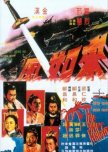
This review may contain spoilers
Not everyone is as they seem...
The Swift Knight was an engaging wuxia starring Lo Lieh, Chin Han, and Margaret Hsing Hui. Most of the main characters were shrouded in secrecy and none were who they appeared to be. Two lost royal heirs drew everyone to them like a magnet, those who wanted to save them and those who wanted kill them. They only had to gamble with their lives to figure out who was on their side.Lo Lieh played the titular character, the Swift Knight. He robbed from the rich and sometimes the suave vagabond gave to the poor. While at a brothel one night the virginal Xian Qin caught his eye, inducing him to offer a down payment, promising to come back with the rest of the money that night. Chin Han, dressed as a beggar, also sought to take Xian Qin away from the brothel, though without paying. Perennial bad guy Wang Hsieh, who had more costume changes than a beauty pageant contestant was after the young woman, too. He wanted to take her away from the brothel—to execute her. The rest of the story involved a number of sword fights and horse chases all in lieu of seeing who would end up with the lass and her younger brother.
The story of political intrigue and secret identities was a familiar formula but entertaining nonetheless. Lo Lieh had the perfect charisma to play the shady Robin Hood. If I have one complaint about the movie it's that Lo wasn't used enough and he's such a dynamic actor that he makes even small scenes seem bigger. Chin Han gave a rather one note performance as the beggar hiding an honorable identity. Fan Mei Sheng as the constable who knew too much and was on the run with the little group provided levity without sliding into slapstick territory. Margaret Hsing Hui didn't give the greatest performance but was able to convey her character's reticence about living a royal life, especially after she had fallen in love with the Swift Knight. Wang Hsieh never met scenery he didn't want to chew and made for the perfect villainous foil for the good guys.
This was one of those rare Shaw Brothers movies which showed the care and forethought that was put into the script and settings. For a low budget martial arts movie, it had a scenic depth to it and didn't look like it was shot on a small sound lot. Flashbacks were bathed in vibrant blue or red. Well-developed characters made for a compelling story. In a martial arts film, complex characters you can care about give the fights higher stakes. Lau Kar Wing and Chan Chuen choreographed several fluid fights with plenty of dismembered arms and blood, though not the artery spewing type that would become popular in a few years. Most of the action was sword fighting although the baddies as always used some sinister weapons in addition to swords. Because it was a wuxia there was classic light body leaping. Instead of the old school filming in reverse, the wire work used was smooth and graceful, no flailing of arms, and happily I couldn't see the wires.
Director Cheng Chang Ho pushed the envelope for a SB film and gave it a hint of artistic flare, something often missing from this low budget genre. He even gifted the audience with a proper ending instead of the oft used freeze frame in mid-scene during the final fight! The Swift Knight had interesting characters, an intriguing story, and entertaining fights. For a fan of 1970's martial arts movies, what else could you ask for?
6/26/23
Was this review helpful to you?
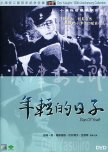
This review may contain spoilers
"Humans are beggars, they all want something"
Director Ozu made this film about two college buddies when he was 26 years old. Of his first eight films this is the oldest title to survive. Sadly, seventeen of his films before 1936 were lost and only fragments remain of a few others. Each of these extant films is a gift. With the exception of repeated use of architectural items in the intro and finale of the film, there would be little to suggest this was his film. Moving films were still in their infancy and young Ozu appeared to be experimenting with the medium.Yamamoto and Watanabe are college buddies who don't take studying too seriously even with exams coming up. Yamamoto has met a girl, Chieko, who is knitting socks for him and later Watanabe meets her when he rents her his room. After exams many of the students and Chieko go to a ski resort. Under "I saw her first Bro" law, Yamamoto should have had first dibs on wooing her, but Watanabe uses every trick in the book, most at Yamamoto's expense to have time with her alone. In the end, the two boys fail at everything except maintaining their friendship and keeping their sense of humor about it all.
This was a challenging film to finish for me. The film was long for a silent film that didn't gain any traction until about 50 minutes into it. Watanabe was selfish, boorish, a moocher bordering on thief, and thoughtless to those around him. He acted like a rakish frat boy much of the time. Why Yamamoto stayed his friend was a mystery.
Nearly half of the film took place on a snowy mountain which had to be a record for outdoor scenery for the director. His later films felt more static and mostly took place in carefully composed rooms. This comedy involved pratfalls and movement walking up the mountain and skiing or falling down it. For the modern viewer it will make you more grateful for ski lifts. The later rigidity of the characters staring into the camera to say their lines was thankfully absent in this film. Though his scenes flitted by faster instead of the beautiful lingering shots he was known for, the movement was needed for the two energetic youth. The skiing scenes were well shot. The film was badly marred by salt and pepper pocking as well as some shadowing around the edges. I don't know if there is a restored version available somewhere but this film was definitely in need of some loving restoration.
Days of Youth was also in need of likeable characters to devote 100 minutes to, in the end the breathtaking views of the snow-covered mountain were the most interesting part of the film for me. Ozu would go on to develop a more polished film style and tighter and more meaningful writing. Everyone has to start somewhere and learn the ropes. For Ozu, I'm sure he found a deeper interest in the unorthodox friendship between oddballs, I just couldn't see it.
6/22/23
Was this review helpful to you?
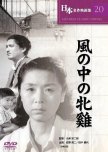
This review may contain spoilers
"What would you do?"
A Hen in the Wind was a difficult film to sit through. The film was set in occupied post WWII Japan when it was recovering from the damaging effects financially and emotionally from the war. In the homes, marriages had been tested as women struggled to maintain households with the men away for years. Ozu veered into melodrama and physical violence with one such marriage, something he did not often do, and which was troubling for these 21st century eyes.Tokiko and her son are expectantly waiting for her husband to be repatriated after the war. She's sold nearly everything she had and is almost penniless. Her friend is also short on cash but helps her when she can. After selling her last kimono Tokiko has enough money to eat for awhile longer when disaster hits. Her son becomes dangerously ill and the hospital requires a cash payment up front for his life saving treatment. With no one else to turn to for such a large sum of money she sells herself for one night to save her child's life. After her husband comes home, she is unable to lie and tells him what she had done. Far from being grateful for saving his son's life, Shuichi becomes livid and interrogates her. He visits the brothel in order to find out if she had been a regular there. He meets a 21-year-old girl and sympathizes with her reason for having to prostitute herself and vows to find her employment. His boss agrees to hire her, but points out to Shuichi that hypocritically he had no problem forgiving and understanding a stranger but could not do so for his own wife. Shuichi acknowledges his wife had no choice. He just can't seem to let go of his anger. Later that night when Tokiko begs him to stay home, he "accidentally" pushes her down a tall flight of stairs. The "accident" seems to knock some sense into him and he tells Tokiko they need to forget the past, embrace, trust each other from here on out and live as they were supposed to.
The level of intimate violence in this film disturbed me greatly. It was heavily implied that Shuichi raped Tokiko. The poor woman had been victimized twice. Once by crushing poverty and a heartless medical system and a second time by her spouse. Shuichi manhandles her on several occasions, one of which causes her fall. The fall was filmed to show just how brutally her body slammed against the stairs over and over. Shuichi could not even be bothered to help her as she finally dragged her limping body back up to their room. When he declared that their estrangement was over and they would both forget what had happened it was hard to take him seriously. Nowhere in his self-righteous monologue did he tell her he was sorry for his behavior and make sure she was okay. Perhaps Ozu was using the marriage as a metaphor for Japan showing after its disgrace, it could all be put behind them in order to face a brighter future. Whatever the reason, it has been a long time since I've despised a character as much as I have Shuichi. He had every right to be taken aback and troubled, but his utter lack of empathy and physical rage toward Tokiko was disconcerting as he played the victim.
Ozu, as other directors had done, asked the question, "What would you do?" During times of financial crisis especially when a life is on the line, what would a person do? In this case a mother was willing to shame herself in order to save her child's life. It's easy to judge when money is available, but when it's not and there are few options, people will do what they must to survive and for their children to survive. And in this instance Tokiko was still the same truthful person she'd always been with her husband and told him what she'd done.
Even if I hadn't known this was a film by Ozu I would have recognized his work. The repeated use of architectural shots, especially of the gas storage units next to the slums where Tokiko lived were a dead giveaway as well as the precisely organized and decorated rooms the camera lingered over. He also showed the rusted-out remnants of sewer pipes several times usually in conjunction with Shuichi. I don't know what his meaning behind the sewer pipes meant, but I know how I viewed them in regards to the husband with the hurt male pride. If their marriage had been contaminated it was not by coerced infidelity but a cruel world that would let a child die and a husband who could not understand the cost to his wife. I found it interesting that the brothel was neater and cleaner looking than the heartless hospital. Finally, Ozu was already doing the directing style of actors looking straight into the camera to talk. This was his one technique that often disengaged me from the story because it didn't feel natural or intimate, more like breaking the fourth wall.
What I did find of great value in this film was Tanaka Kinuyo's emotionally honest performance. She conveyed a plethora of emotions that all rang true. Her devastated face and torn dress told you all you needed to know in one scene. Regardless of the situation, Tanaka gave her character great depth even when you might not agree with her actions. It rendered Shuichi's actions unforgiveable because Tanaka conveyed Tokiko's suffering so well that it made you wonder how anyone could not want to comfort her. In fact, it was the women of this film who tied it together. They had no choice but to keep moving and doing what they must without falling into despair. They were the ones who stood by each other, shared, and even as they joked about rising prices and rations gave the impression that hope was on the horizon.
If you can set aside the marital violence, which can be a tough assignment, A Hen in the Wind asked pertinent questions. The film also gave a glimpse into Japan's post war trauma in a way only Ozu could. Despite the destruction and shame, the resilience of the people, like in Tokiko's marriage would rise up and make a better day putting the past behind them and face the future with honor and courage.
6/21/23
Was this review helpful to you?
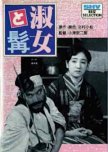
This review may contain spoilers
Lighthearted romantic comedy
So many silent films from this era were tragic and melodramatic. Ozu's The Lady and the Beard was a breath of fresh air with its lighthearted comedy and sweet romance. No deaths, no one forced into prostitution, no devastating understandings. This easy, delightful comedy may leave you a little like me, weak in the knees from relief.Okajima is a college student and kendo master, but what makes him stand out is his large bushy beard. His friend, wealthy Teruo, invites him to his sister's birthday party after a match. On the way there, Okajima rescues a kimono clad Hiroko from Satoko, a girl gangster. Later at the party, Teruo's sister and her friends disdain the bearded and coarsely mannered Okajima and try every way they can to embarrass him which proves fruitless.
After graduation, Okajima struggles to find a job. Hiroko, who had been a secretary at one of the places where he interviewed finds him and tells him he lost out on the job because of his beard. Like wise men everywhere, he listened to her and shaved his beard and was instantly hired at a hotel. Not only did it help with his employment but now Ikuko and Satoko were also interested in his clean-shaven face and ability to defend himself and by extension-them.
This film which fell into the post college time of life for Ozu's characters was made in eight days. Unlike Ozu's later films with rigid shots of people and settings, the people and scenes flowed more easily. This was before he had people staring into the camera to recite their lines, which always felt forced to me. I liked the fluidity of this one though I did miss his traditional geometric shots and ubiquitous teapot.
Ozu touched on his oft used theme of traditionalism vs modernism. Okajima with his old-fashioned beard used to scare away women (which he learned from Abraham Lincoln) personified traditionalism. Hiroko, though soft voiced and wearing a traditional kimono also understood the more modern and western ideas. Ikuko was more modern but also from a noble family and was entrenched in her wealthy elitist lifestyle. Finally, modern girl Satoko had gone so far astray that she had fallen into a life of crime. Satoko drove a really nice Lincoln car with a huge greyhound hood ornament though. Okajima and Hiroko did a gentle push-pull dance each moving toward and from strictly traditional ways and strictly modern ways. Ozu found a nice middle of the road for them to travel.
The Lady and the Beard was a pleasant romantic comedy where everyone learned a few life lessons and more about themselves. The comedy could veer into silly slapstick but it never lost its heart when it did. It was a simple story and a simple film that was simply entertaining.
6/20/23
Was this review helpful to you?
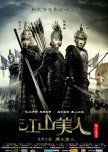
This review may contain spoilers
"No need for a good man"
An Empress and the Warriors was a lushly shot film set during the warring kingdoms that tried to take flight but tumbled to earth due to lack of a compelling story. A warrior turned doctor attempted to show an empress the world in his high-flying ride only for her to be drawn back into her old life.The Kingdoms of Yan and Zhao have been in a generations old war with each other. During a battle the Yan emperor is struck with an arrow and bequeaths his kingdom to his trusted general, Muyong Xue Ha (Donnie Yen). When it looks like the move will create a civil war he gives the crown to the emperor's daughter, Yan Feier (Kelly Chen). Her vile cousin, Hu Ba (Guo Xiao Dong) stirs the court saying the emperor can neither be an orphan like Xue Ha or a woman like Feier. Feier promises to train as a warrior to be worthy of her title. Hu Ba hires a lethal gang of assassins and sets them after Feier. After being shot with a poisonous dart, she is saved by warrior turned doctor Duan Lan Quan (Leon Lai). Feelings spark but she has to go home to protect the country.
After battling the Zhao again, she abdicates the throne to Muyong and races back to Duan. Despite her previous speeches about the needs of the people, she makes the whiplash inducing decision to take care of her own needs instead. While floating in a magic balloon with her lover, her actions result in a disaster for the stability of the kingdom.
The movie was beautifully shot with plenty of iconic scenery for the battle and training montages as well as the romantic montages all overlaid with emotionally swelling music. So many montages. The military armor looked glorious in the well-choreographed battle and fight scenes. Duan's elaborate tree house felt summoned out of a fairytale or a movie set in Sherwood Forest. The movie's appearance was stunning. Unfortunately, the love triangle was wobbly at best and the grand romance felt forced and short-tracked, lacking in chemistry. Chen was more believable as the fierce warrior a la Mulan than the pouty princess. The writers did her a disservice by having her running back and forth between love and duty especially for someone who constantly commented on her commitment to her people. Yen made the most of his supporting role and stood out in his armor even though it kept him from his usual acrobatic fighting. Guo was saddled with few scenes and being cast as the stereotypical greedy villain who desired the throne over the good of the people. Leon Lai's love interest came across as bland and more than a little preachy.
If the writers had not made the empress appear so flighty in her emotions and loyalty it would have been a much stronger film for me. She ultimately embraces her role and duty but even then, it was when she had so few choices left. They missed out on creating a courageous female character of greater depth and wisdom. In the place of writing a compelling and consistent female lead, the writers gave us battle after battle, and montage after montage. An Empress and the Warriors kept the action full throttle throughout the film creating an exciting ride if not a memorable or magical one.
6/15/23
Was this review helpful to you?
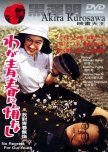
This review may contain spoilers
"Freedom is something you have to fight for"
In No Regrets for Our Youth, Kurosawa Akira presented many questions, but gave few answers. More than a political referendum on Japan's militaristic actions, the film focused on Yagihara Yukie's responses to the events going on around her, the choices she made and how she grew into her own sense of responsibility and freedom.The film begins using the actual Takigawa incident at the Kyoto University in 1932 as a springboard, only with fictional characters. In the film, Yukie's father, Professor Yagihara, comes under fire for his liberal opinions. Students protest and professors are fired or quit. During this time, Yukie is torn between two students. Itokawa doesn't rock the boat and conforms to what is going on in the country. Noge Ryukichi is a firebrand firmly against the country's militaristic actions and leans decidedly left. Noge chooses a path away from the school leading to a stint in jail while Itokawa stays, becomes a prosecutor, and woos Yukie. After a recently released Noge accompanies Itokawa to a family dinner, Yukie realizes she needs a fresh start for she still loves Noge and does not want the dull life Itokawa offers. She moves to Tokyo to work, later meeting and marrying Noge. The two are incarcerated around the time Pearl Harbor is bombed. When Yukie's parents are finally able to have her released, she travels to her in-laws instead of staying in the relative wealth of her parents' home. Her in-laws live as night owls due to their connection with Noge and are ostracized by the villagers. Yukie finds what she's been missing as she digs into the earth at her mother-in-law's side planting rice.
Yukie, played by Ozu regular Hara Setsuko, goes from flighty, rash, entitled daughter to a woman so sure of herself that Itokawa proclaims, "Your sheer life force makes me feel ashamed!" The two male leads are as gray and uninteresting as the screen in the movie. Without Hara, the film would be too bland to care about. No Regrets for Our Youth was the last of Kurosawa's movies featuring a woman. Yukie was certainly one of his most interesting and likeable female characters. The film took a long time for her to go from her father's beliefs, to her husband's to finally finding her own beliefs. Her father knew the path she was taking would be difficult. "Remember that there will be sacrifices in the struggle for freedom." For the individual or the country, it would be true for both. Noge and Yukie held to the motto, "No regrets in my life" and that sustained her through her many trials. Her turning point, epiphany if you will, seemed to come while standing calf deep in the mud of a rice paddy. The film didn't really become interesting to me until the last third to quarter when Yukie finally started coming into her own.
The film itself felt poorly edited for a Kurosawa film. At the beginning of the film, the students on a hilltop hear gunfire believing it to be practice but find a badly wounded soldier just below them, something that was never explained. Perhaps it simply required a greater familiarity with the history of this time. While Yukie commanded the screen, her actions and emotions could be erratic, almost manic. One moment she's laughing, the next she's crying, or staring blankly into space, constantly swinging between extreme emotions. Her actions could be rash with Kurosawa unwilling to give us a reason for them. Though the politics of the time impacted the characters' lives, aside from the evils of militarism and the gestapo-like Tokko/Thought Police who cracked down on freedom of thought, the politics seemed rather vague most of the time. We don't know specifically what the professor said that caused him to be fired or what Noge did that landed him in jail. For the most part we only see how the events caused Yukie to react and their impact on her.
Near the end of the movie a title declares, "War Ends. Freedom Restored." Just as Noge had predicted, his work would be seen in light of fighting for Japan's peace and prosperity. At this point Yukie's family expects her to return to her comfortable life now that her husband's actions are framed in a positive manner. For Yukie, she has found her freedom and where her responsibility lies and it is in a simple life working with the dirt of the earth. The vacuous girl has grown into a woman who has sacrificed much to earn her place in the world and she's not willing to go backward. No Regrets for Our Youth started out slow but finished strong largely on the performance of Hara Setsuko.
6/10/23
Was this review helpful to you?

 49
49 165
165 10
10






















